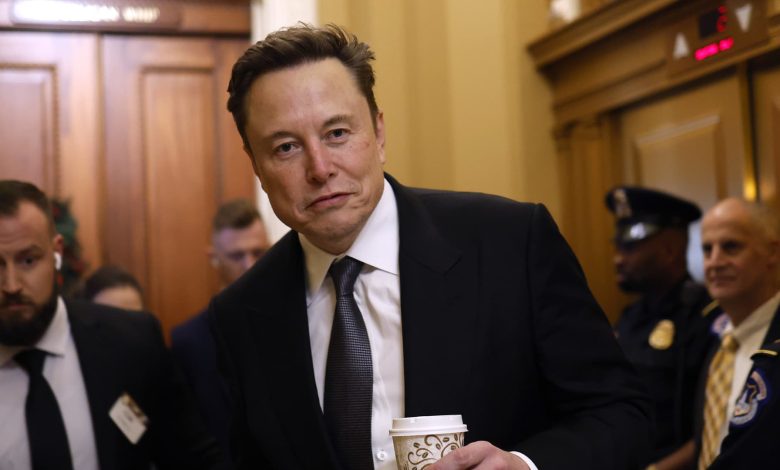Musk calls to impeach judge whose order blocks DOGE from Treasury systems access

Elon Musk has called to impeach a federal judge in New York, Paul Engelmayer, over an order that temporarily restricts the tech centi-billionaire and his DOGE team from accessing U.S. Department of Treasury payment systems and sensitive data.
Over the weekend an outraged Musk posted on X, the social network he owns, calling Engelmayer, “A corrupt judge protecting corruption,” adding, “he needs to be impeached NOW!” He also posted an explanation on X of what he wants to do with the Treasury Department.
Musk and his special government employees, who are part of his DOGE initiative, are tasked by President Donald Trump with finding ways to slash the federal budget, massively reduce the federal workforce, and eliminate as many federal regulations and agencies as possible.
Thus far, Musk’s DOGE team has mostly targeted agencies that use a tiny portion of the overall federal budget, including the foreign humanitarian assistance agency, USAID. DOGE specifically “sought access to the U.S. Department of Treasury payment system to stop money from flowing to the U.S. Agency for International Development,” the Associated Press previously reported.
Engelmayer, a U.S. District Judge appointed by former President Barack Obama, issued an order temporarily blocking DOGE from accessing those systems on Saturday in response to a complaint brought by 19 states’ attorneys general against President Trump, the Treasury and its newly appointed Secretary Scott Bessent.
Musk subsequently posted on X, “This ruling is absolutely insane! How on Earth are we supposed to stop fraud and waste of taxpayer money without looking at how money is spent? That’s literally impossible! Something super shady is going to protect scammers.”
In response to Musk’s remarks, New Jersey Attorney General Matthew Platkin, who is among the plaintiffs in the case, told CNBC via e-mail, “What’s shady is a tech billionaire breaking the law to try to steal millions of Americans’ sensitive data.”
The attorneys general from 19 states argued in their complaint that President Trump failed to “faithfully execute the laws enacted by Congress,” in giving Musk and his team unparalleled access to the treasury’s computer systems and taxpayers’ sensitive data stored or processed in them.
After the order was issued, Musk shared a post from a follower on X who suggested DOGE should defy the court’s order.
On Sunday, Vice President JD Vance, who is a Yale-educated attorney, posted on X that in his view, “If a judge tried to tell a general how to conduct a military operation, that would be illegal. If a judge tried to command the attorney general in how to use her discretion as a prosecutor, that’s also illegal. Judges aren’t allowed to control the executive’s legitimate power.”
New Jersey Attorney General Platkin said, via an e-mailed statement, “We absolutely expect the defendants to comply with the order, which the court issued in light of the egregiously illegal actions at issue and the enormous risk they pose to cybersecurity and privacy. Our nation is built on the rule of law, and we intend to pursue it to the maximum extent to protect our residents.”
According to legal scholars, the judiciary historically has been able to restrain the executive branch from violating the Constitution and other laws.
Joyce White Vance, a law professor at the University of Alabama School of Law and legal analyst for NBC News, wrote in an e-mail on Sunday: “The Constitution and our rule of law tradition are set up so that the courts have jurisdiction to consider the scope of power possessed by the executive branch (the president), when his actions are challenged. That’s why we are seeing groups of state AGs go to court to challenge whether Trump has legal authority to take steps like canceling birthright citizenship, suspending Congressionally authorized spending, and sending DOGE out to federal agencies.”
She noted that “centuries of precedent establish the role of the courts in checking overreach by the executive branch,” including cases like Youngstown Sheet & Tubing Company v. Sawyer, where the U.S. Supreme Court refused to let President Harry S. Truman take over U.S. steel mills during the Korean War.
Marin K. Levy, professor of law at Duke Law School, told CNBC via e-mail on Sunday: “The State Attorneys General and the judge in this case were all acting well within their authority. What we saw here was the judicial system working as it is supposed to.”
She also emphasized what the court decided yesterday was not a final ruling on the merits of the case. Rather, the court has granted a request for emergency relief (also known as TRO, or temporary restraining order) by the attorneys general. The professor explained, “This is done in cases in which there is concern that irreparable harm will occur before a court can even decide the merits of the case. And now another judge will decide the merits.”
Musk has repeatedly accused judges of corruption, illegal or suspicious conduct after he was displeased with their orders or opinions.
For example, he lashed out at Chancellor Kathaleen McCormick in the Delaware court of Chancery, after she found Musk’s 2018 Tesla CEO compensation package, worth tens of billions, had been granted illegally and must be rescinded.
He also repeatedly lashed out at the head of Brazil’s Supreme Court, Justice Alexandre de Moraes, as the country pushed X (formerly Twitter) to comply with its social media regulations. After months of legal battles there, and posts denigrating de Moraes on X, Musk acquiesced to the court’s demands, paid fines and complied with Brazilian laws.
The case impacting Musk’s access to treasury data and computer systems is State of New York, et al v. Donald Trump, et al in the Southern District of New York (Case 1:25-cv-01144-JAV). Read the judge’s order here.



